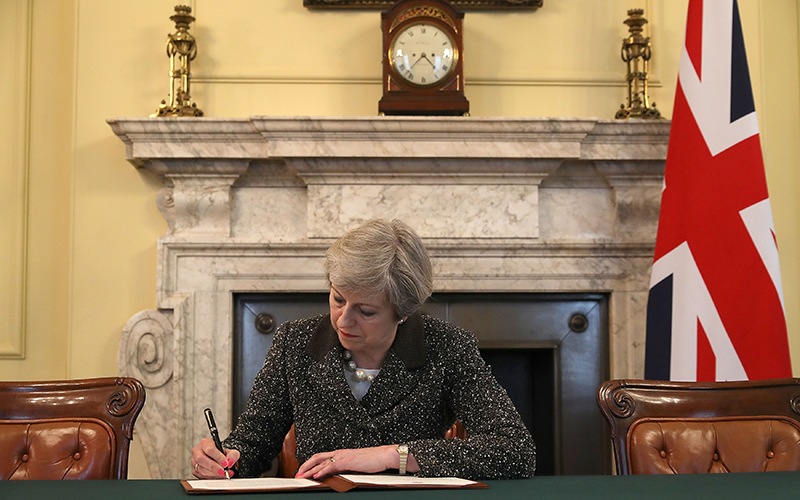
Photo: PA
The prime minister told Parliament during PMQs “this is an historic moment” for Britain “from which there can be no turning back”.
She continued: “Today the government acts on the democratic will of the British people. And it acts, too, on the clear and convincing position of this house.”
May said Britain’s best days lie ahead and that the nation should come together as the country aims to emerge “stronger, fairer, more united and more outward-looking than ever before”.
She added: “I am ambitious for Britain. And the objectives I have set out for these negotiations remain. We will deliver certainty wherever possible so that business, the public sector and everybody else has as much clarity as we can provide as we move through the process.”
The prime minister said tomorrow the government would publish a white paper on plans to convert the EU acquis into British law so that “everyone will know where they stand”.
She said the UK would seek a “new deep and special partnership between Britain and the European Union”, which would be one of shared values and interests. Labour leader Jeremy Corbyn warned the government not to “use Brexit to attack rights and protections, cut services and create a tax dodgers’ paradise” as he alleged some “hard-line Tory ideologues” may desire.
Corbyn said that the Treasury estimated that leaving the European Union on World Trade Organisation terms would lead to a 7.5% fall in GDP and a £45bn loss of tax receipts if the government opted for a so-called “no deal” hard Brexit.
Responding to the letter to the EU officially notifying it of the UK’s intention to leave the union, the European Council acknowledged its sadness but said it was ready.
The statement read: “We regret that the United Kingdom will leave the European Union, but we are ready for the process that we now will have to follow.
The European Council said its priority was to “minimise the uncertainty caused by the decision of the United Kingdom for our citizens, businesses and member states”.
In its statement the council said it would approach these talks constructively and “strive to find an agreement” under which the UK would continue as a close partner.
European Council president Donald Tusk has convened a meeting of the council on 29 April.
Meanwhile, senior civil service representatives warned that government needed to ensure Whitehall was adequately resourced to deal with the Brexit process and the consequences of leaving the EU.
FDA general secretary Dave Penman said: “Civil servants will now be at the heart of delivering new trade relationships, transposing EU laws into British ones and overhauling immigration, customs and agricultural policies currently handled by the EU.
“If the government wants to retain the talented civil servants it already has, as well as attract the new skills required to prepare for a post-Brexit Britain, now is the time to seriously review its approach to departmental spending, workforce planning and civil service pay.”
Today, CIPFA also announced it was launching an independent advisory commission on Brexit to consider the implications for the public sector. The commission will be chaired by former Liberal Democrat MP Julia Goldsworthy.



















